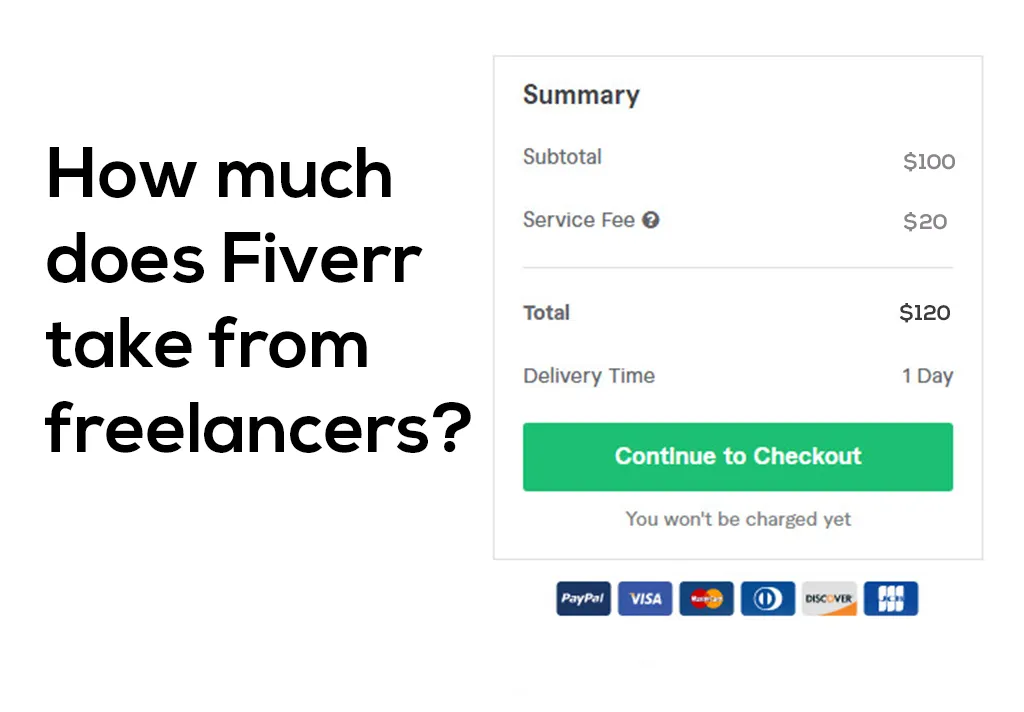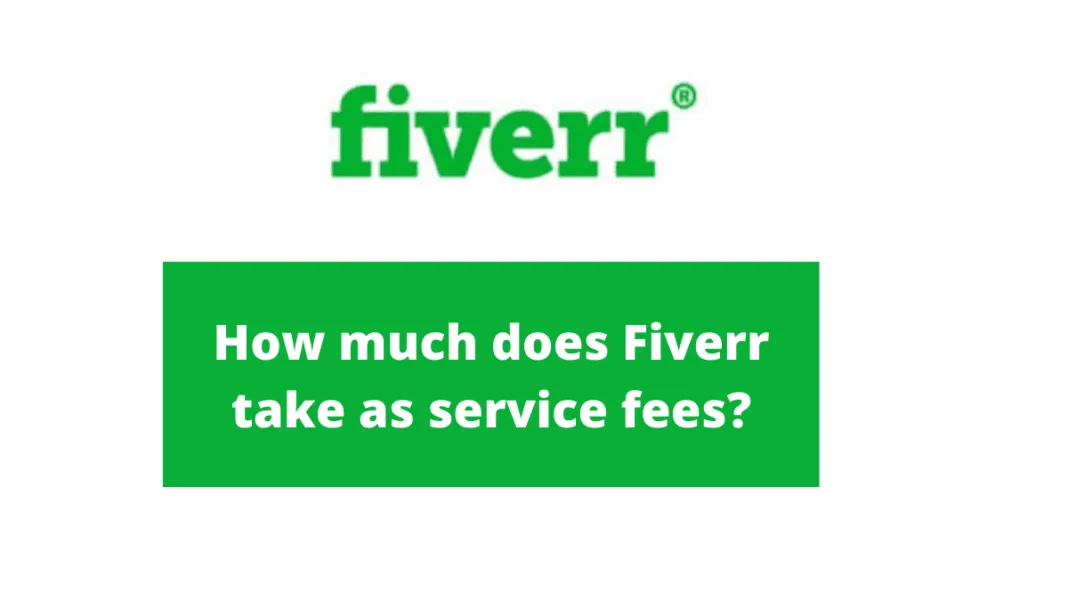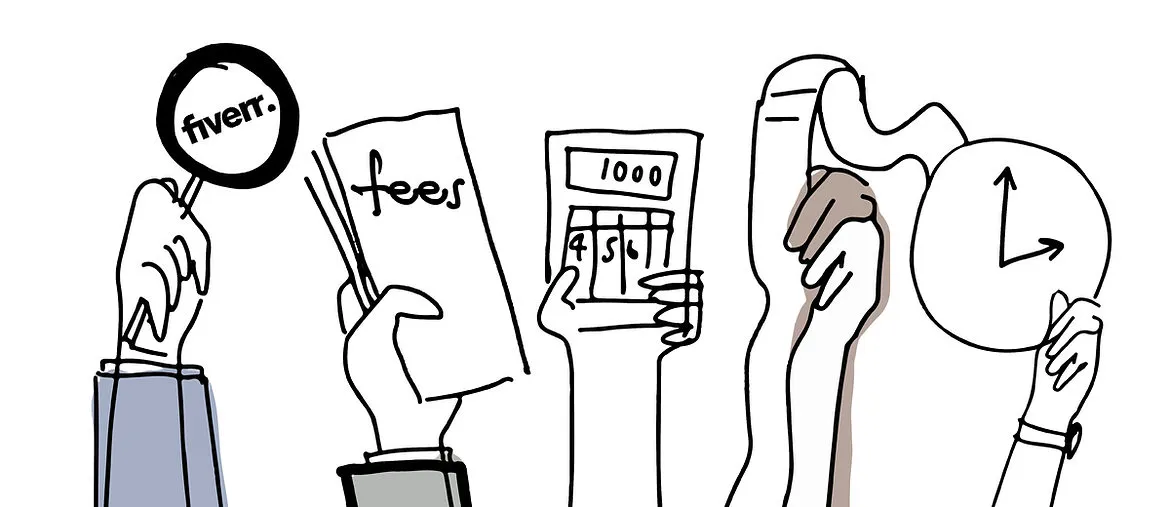Fiverr has emerged as a groundbreaking platform, connecting freelancers and clients from all corners of the globe. Whether you’re a graphic designer, writer, or digital marketer, Fiverr offers a marketplace where you can showcase your skills and services. Founded in 2010, this platform allows businesses and individuals to source professional talents at affordable prices. With gigs starting from just $5, Fiverr makes it enticing for both newcomers and seasoned professionals to engage in freelance work. In this post, we’ll dive deeper into how Fiverr operates, particularly focusing on its fee structure that affects both freelancers and clients.
Overview of Fiverr's Fee Structure

Understanding Fiverr's fee structure is crucial for any freelancer or business considering using the platform. When you dive into Fiverr, you’ll find a transparent yet multifaceted fee system designed to maintain a sustainable marketplace for both buyers and sellers. Here’s a breakdown of the key elements of this fee structure:
- Service Fees for Buyers: Fiverr charges a service fee to buyers ranging from 5% to 20% of the total order amount. This fee often depends on the price point of the gig.
- Commission for Sellers: When freelancers make a sale, Fiverr takes a commission of 20% from the total earnings. This applies to all completed transactions, significantly impacting the net income of sellers.
- Payment Processing Fee: Besides service fees, buyers may also incur foreign transaction fees or payment processing fees based on their payment method.
Let’s look at an example to make this clearer:
| Order Amount | Fiverr's Cut (20%) | Freelancer's Earnings |
|---|---|---|
| $100 | $20 | $80 |
| $50 | $10 | $40 |
| $200 | $40 | $160 |
In summary, while Fiverr provides a platform for freelancers to earn an income, it’s essential for sellers to factor in these fees when determining their pricing strategies. By understanding how Fiverr’s cuts work, freelancers can ensure they’re setting reasonable prices for their services while maintaining a viable profit margin.
Also Read This: How to Make Money from Fiverr in Nigeria
Breakdown of Fiverr's Service Fees

Fiverr has carved out a niche in the gig economy by providing a platform where freelancers can offer their services in various categories. But, like any business, they have to make money too. That's where their fees come in. It's essential to understand how Fiverr structures these charges, so you can budget your services accordingly.
When you sell a service (or “gig”) on Fiverr, the platform takes a *20% cut of your earnings. This percentage applies to the total amount you charge your buyer, which includes any extras or upgrades you might offer. So, for instance, if you sell a service for $100, Fiverr will take $20, leaving you with $80.
Now, you might wonder why Fiverr takes such a considerable cut. Well, think about it—Fiverr provides a marketplace, helps you reach potential clients, handles payment processing, and offers buyer protection. All these services help ensure a more seamless transaction.
To break it down further:
- Gig Price: $100
- Fiverr's Cut: $20 (20%)
- Your Earnings: $80
For higher-priced services, this fee can seem hefty, but many freelancers feel the exposure and ease of use justify the cost. Understanding this fee structure upfront can help you set more strategic pricing for your services.
Also Read This: How to Create an Effective Gig on Fiverr
Additional Fees and Charges

While the primary fee structure is straightforward, Fiverr also has a few additional fees and charges that you should be aware of. These can affect your overall earnings and budgeting, so let’s dive into them.
One of the most common additional charges is the service fee for buyers. When they make a purchase on Fiverr, they are usually charged a service fee that ranges from $2 to $10 depending on the total amount they spend. This fee is designed to help Fiverr cover their operational costs.
Another potential cost you need to keep in mind is the currency conversion fee*. If you're selling services to clients who are paying in a different currency, you might incur additional costs due to conversion rates charged by payment processors. This can vary by your payment method and might eat into your total earnings.
Here's a summary of notable additional charges:
| Charge Type | Details |
|---|---|
| Service Fee for Buyers | Ranges from $2 to $10 based on purchase amount |
| Currency Conversion Fee | Varies based on payment method |
In summary, knowing the fees Fiverr charges—both for you and your clients—helps you navigate the platform more effectively. Make sure to factor these in when pricing your services to ensure you meet your financial goals!
Also Read This: Why Are My Gigs on Fiverr Getting Paused?
Comparison with Other Freelance Platforms
When you're stepping into the freelancing world, it's always smart to compare different platforms to see where your hard work pays off the most. Fiverr is just one of the many options out there, so how do its fees stack up against others like Upwork, Freelancer, or even Toptal?
1. Fiverr
- Fiverr typically takes a 20% commission on every transaction. So if you sell a service for $100, you walk away with $80.
2. Upwork
- Upwork uses a sliding scale for freelancers. It starts at 20% for the first $500 billed to a client, decreases to 10% between $500.01 to $10,000, and then drops to 5% for billings over $10,000.
3. Freelancer
- Freelancer charges 10% or $5 (whichever is greater) for projects, and it also has a contest fee structure that varies.
4. Toptal
- Toptal typically works with top-tier talent, charging clients a premium. The fees can range from 15% to 20% depending on the contract.
Overall, Fiverr’s straightforward commission model is attractive for quick gigs and one-off projects. However, platforms like Upwork might be more advantageous for long-term client relationships due to their lower commission rates over time. So, what you choose really depends on your working style and what you find most beneficial!
Also Read This: What is Fiverr Stock Symbol?
Impact of Fiverr's Fees on Your Earnings
Fiverr's fee structure can be a head-scratcher at first, especially when you're trying to maximize your earnings. Let's break down how these fees impact your bottom line in a practical way.
Imagine you land a project worth $200:
- Before Fiverr’s commission, you feel pretty good about that $200. But don’t forget—Fiverr takes its cut!
- With a 20% fee, you'd be looking at:
- Fee Deducted: $200 × 0.20 = $40
- Your Take-Home: $200 - $40 = $160
This example shows how Fiverr's fees can significantly eat into your earnings. Over time, these deductions can add up faster than you'd think. Think about it this way:
| Project Amount | Fiverr's Fee (20%) | Your Earnings |
|---|---|---|
| $100 | $20 | $80 |
| $500 | $100 | $400 |
| $1,000 | $200 | $800 |
With every project, knowing how much Fiverr takes can help you set your prices more effectively. Many freelancers choose to increase their rates to compensate for these fees. It’s worth doing the math to ensure you’re still making a decent living while using the platform!
Also Read This: Do You Have to Charge Sales Tax on Fiverr?
7. Tips for Maximizing Your Earnings on Fiverr
So, you're on Fiverr and you want to rake in those dollars, right? You've come to the right place! There are some practical tips and strategies you can employ to boost your income while selling your services. Let’s dive right in!
1. Optimize Your Gig Title and Description
Your gig title and description are the first things potential buyers will see. Make sure they are clear and keyword-rich. Use terms that buyers might search for when looking for your service. Don’t forget to be concise yet descriptive!
2. Use High-Quality Images and Videos
The first impression is everything. Use high-quality images that showcase your work and consider adding a video introduction. Video can significantly increase engagement and make buyers feel more connected to your service.
3. Offer Packages
Instead of a single service, consider offering tiered packages (basic, standard, and premium). This allows buyers to choose their level of investment and can lead to higher overall earnings.
4. Promote Your Gigs Beyond Fiverr
While Fiverr exposes you to a vast audience, don't rely solely on their platform. Share your gigs on social media, your personal website, or even forums related to your niche to attract more customers.
5. Deliver Excellent Customer Service
Happy clients often return for more services and refer you to others. Quick responses and diligent follow-ups can make a difference. Encourage positive reviews, which can also help boost your visibility on Fiverr.
6. Continuously Update Your Gigs
Your skills may evolve over time, so it's essential to keep your gigs updated. Regularly refreshing your offers shows that you’re active and engaged, which can attract new clients and repeat business.
8. Conclusion: Making Informed Decisions on Fiverr
Navigating the world of Fiverr can be both exciting and challenging. With the right understanding of fees and how to maximize your earnings, you can set yourself up for success!
Remember, while Fiverr takes a cut of your earnings, the platform provides you with access to a global marketplace that you wouldn't have otherwise. This can lead to opportunities that far exceed the initial fees, especially if you're proactive.
Stay informed about changes in policies and fees. Utilize tips to optimize your gigs, and don’t hesitate to experiment with different strategies to see what works best for you.
In summary, being on Fiverr is not just about creating gigs; it's about continuously improving, building relationships, and adapting your offerings. With a little effort, your Fiverr journey can lead to meaningful income and professional growth!



